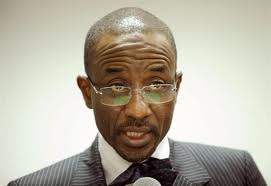The Governor of the Central Bank of Nigeria, Malam Sanusi Lamido Sanusi, has attributed the infrastructure deficit being recorded in the country to absence of long-term low-interest financing.
Sanusi said this on Wednesday in Abuja when members of the board of the Infrastructure Concession Regulatory Commission visited him.
He said a major gap in the country’s financial system was the absence of long-term low-interest financing, pointing out that countries worldwide, which finance infrastructure, usually provided such facility.
He said: “People need to look at how some countries did it.
“In China, they set up state-owned banks and those banks lend money at seven to nine per cent for 10 to15 years for the building of infrastructure.
“Sometimes, the loans go bad and when they build up the bad loans, the Chinese government will issue a bond, recapitalise the banks and they will continue lending.”
Sanusi said the funds used would be recovered from the industry and income taxes after building the infrastructure.
He said infrastructure development was the surest way to diversify the income base of the country.
The CBN governor said the apex bank had pushed about N850 billion in long-term low-interest fund into the economy.
“This was done under the bank’s intervention scheme in the power, aviation and agriculture sectors,” he said.
Sanusi admitted that the N220 billion Micro, Small and Medium Enterprises Fund was yet to be disbursed to entrepreneurs, but assured Nigerians that action would be taken on it shortly.
He advised that the Federal Government must ensure that funds in the capital market and the pension funds were used to fund infrastructure development in the country.
The CBN governor also said he planned setting up a “policy think-tank” for Africa after he had left office in June, saying this would help to facilitate the continent’s development.
He said: “When I leave office, one of my real objectives is to set up a policy think-tank for Africa and, for me, this is the kind of issues I like to engage in.
“In Abuja, we have just realised that the biggest deficit facing African countries is a policy deficit and not money deficit, because we have got the money all over.”
Sanusi said it was unfortunate that Nigeria would have more than $25 billion in pension funds and not $1 million dollar of it could be put into infrastructure development.
“Something is definitely wrong,” he said.
Earlier, the Chairman of ICRC board, Senator Ken Nnamani, had commended the apex bank for its support in developing a draft infrastructure finance policy for the country.
Nnamani said the visit was to work out avenues to deepen CBN’s Public Private Partnership initiative.
Nnamani said the ICRC was currently involved in pre-contract regulatory activities, with respect to the PPP projects concerning the CBN, NIPOST and the Federal Ministry of Communications Technology.
“We urge you to accelerate this project as it will play a key role in reviving the Post Office as an institution, while providing viable financial services to low income Nigerians, especially in the rural areas,” he said.
Nnamani also urged the CBN to establish a PPP intervention fund and develop a long-term infrastructure financing and funding framework “to provide long tenor funds to support PPP projects”.
He added: “A dedicated PPP infrastructure intervention fund will accelerate critical infrastructure development in Nigeria by making low interest long-term capital available to PPP project sponsors.”
The former Senate president said the proposed intervention fund would also provide support to ministries, departments and agencies and the ICRC for various PPP projects and development efforts.
He expressed optimism that the commission would partner with the apex bank to develop appropriate mechanism “to unlock capital market and pension funds for infrastructure financing in a sustainable manner”.
Sanusi attributes infrastructure deficit in Nigeria to absence of low-interest finance
Previous ArticleLagos to arraign Ejigbo torture suspects soon – AG
Next Article CHAN Eagles pocket another N16m


